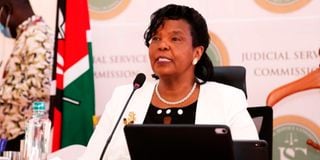Unmasking of interviewees for CJ vacancy and media impact

The chair of the JSC interviewing panel for the next Chief Justice, Prof Olive Mugenda, at the Supreme Court Nairobi on April 14. Such interviews must be transparent.
What you need to know:
- The articles by NMG Head of Legal Sekou Owino are well written and researched.
- The writer has gone to great lengths to be fair and balanced for all the candidates.
Peter Githinji, of Kajiado, is wondering whether it’s a good thing for the Nation to assess the candidates for the position of Chief Justice ahead of the interviews.
Mr Githinji is referring to the series of articles under the label “Search for CJ” that began on April 7.
“Are we very sure the members of Judicial Service Commission [JSC] cannot be influenced by such deeply researched comments?” he asks.
We’re not sure. Even if the commissioners are influenced, there’s nothing wrong with that.
Articles are written for a purpose — such as providing readers with the information they need to make intelligent decisions, education or entertainment.
The articles by NMG Head of Legal Sekou Owino are well written and researched. The writer has gone to great lengths to be fair and balanced for all the candidates — from Fred Ngatia (“Ngatia is qualified, but who can tell what changes he will bring?”) to Prof Moni Wekesa (“Wekesa: The don who relishes new frontiers”).
The articles help to make the search for the next CJ more transparent. This is in line with the thinking of the JSC. Listen to the opening remarks of the chair of the JSC interviewing panel, Prof Olive Mugenda, when the interviews started on Monday:
“The JSC has conducted this process in a transparent and open manner and this has included the uploading of the candidates’ bios and sample writing in the JSC’s website,” said Prof Mugenda. “Similarly, these interviews would be conducted in public.”
She added: “The media is free to air them live and the JSC will also be running all the interviews live in social media pages.”
The interviews have been marked by candour, plain talk, straight shooting and physical unmasking of the candidates.
Exactly 19 minutes and 16 seconds into the first interview, Prof Mugenda intervened: “Honourable Judge, could you, may be, remove your mask so we can see you?”
Justice Said Chitembwe obliged as Prof Mugenda, gesturing, added: “The social distance there is good enough.”
Face became readable
Justice Chitembwe’s face then became more readable. We could see him when he frowned, grimaced, grinned or wept as he was grilled for more than three hours.
Prof Patricia Kameri-Mbote followed on Tuesday. She, too, was asked to remove her mask “so we can see your face”. We could then see when she dimpled or darkened in apparent anger.
On Wednesday, Justice Martha Koome, smiling and articulate, made full use of her unmasked face to conquer the interview.
And so it went on.
The removing of the masks became a part of the openness and transparency of the interviews. The only drawback, or contradiction, is the inscrutable faces of the commissioners themselves.
With the exception of Justice Mohamed Warsame, the commissioners remained masked all the time or most of the time. Only the movement of their eyes, darting side to side, up and down or in a circular path betrayed their feelings, the sting or warmth of their questions and comments.
Openness and transparency should not be one-sided.
***
In last week’s article (“The sins of the father shouldn’t be visited upon the son or vice versa”), I wrote :”Bob Kioko, the host of the Nation FM (now defunct) Changamka talk show....”
NMG librarian Anniel Njoka emailed: “What are you saying is defunct? Nation FM or Changamka show? If Nation FM, it’s up and running.”
Mr Njoka is right. Nation FM took to the airwaves in May 2014, as a re-launch of Easy FM, to concentrate on current affairs.
What is defunct is Mr Kioko’s talk show. The words “(now defunct)” should have come after the word “show”; or a comma should have been inserted after the word “FM”.
The Public Editor is an independent news ombudsman who handles readers’ complaints on editorial matters including accuracy and journalistic standards. Email: [email protected]. Call or text 0721989264.





